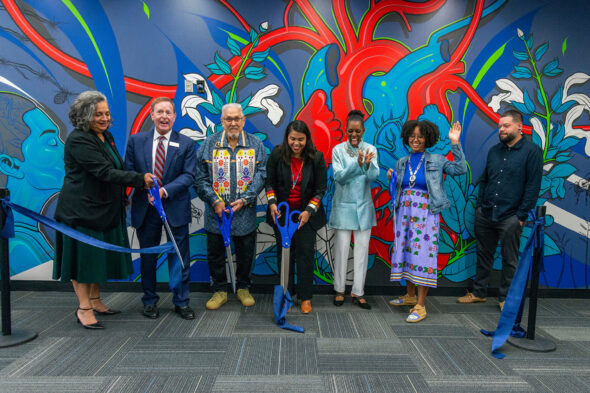Odehmenan Health Equity Center encourages focus on Native American health

Visitors walking into the newly opened Odehmenan Health Equity Center in the Library of the Health Sciences at the University of Illinois Chicago are welcomed by a large, colorful mural representing the center’s aim to provide peace, community and a place to flourish.
The center’s name, “Odehmenan” [pronounced: odéh (oh-debt) me (muh) nan (nan)] is a Potawatomi word that translates to “this heart of ours.” It was selected to honor one of the first people of the Chicago area whose ancestral land the university now occupies and to celebrate the organ necessary to sustain life, said Adriana Black, the center’s founding director and director of health affairs diversity, equity and inclusion.
“We really need to ensure that we’re centering Native American communities, especially regarding health equity, as more and more research shows that they are the group in the U.S. with the lowest life expectancy,” said Black, who is also a PhD student in the School of Public Health.
Black said the purpose of the Odehmenan Health Equity Center, also known as the Odeh Center, is not only to focus on the Native American community but also to help cultivate a community for all students, staff, faculty, alumni and neighborhood partners. The center, located on the west side of campus, serves as a hub for education, events, dialogues and advocacy.
The center is a result of a joint effort between the Office of the Vice Chancellor for Health Affairs, the Office of Diversity, Equity and Engagement, and the University Library. The center will partner with UIC’s seven existing Centers for Cultural Understanding and Social Change to provide programming in the space, focusing on health-related issues.
The goal is to provide a multifaceted space that supplies places for people to convene, Black said. There are areas for people to gather in small study groups and lounge chairs where people can sit and chat. A room with a conference table and audiovisual equipment is available to host meetings. A spacious classroom with a podium, chairs and desks is also open. Although the center has hosted a few events focusing on health equity and cultural issues, a more formal event process will be launched in the new year.

The mural, by Pilsen artist Miguel A. Del Real, was commissioned to highlight the connection between medical science and human nature and health. It uses the color palette of UIC and UI Health and celebrates the Native American community. A heart connects nature — including bees and sacred plants — to humankind.
The heart depicted at the center of the mural represents the Odehmenan Potawatomi word for “this heart of ours,” according to the artist.
“There is a mind, body, spirit connection depicted with the whimsical flowing lines that interweave all the elements. The human figures are ambiguous. They’re reflective, trusting and ready to give or receive — while incorporating the four sacred plants: tobacco, sage, sweetgrass and cedar…,” according to the artist’s statement.
Donald Perrot, a Potawatomi elder and language expert, partnered with Black and others from the Office of the Vice Chancellor for Health Affairs, including Michael Wesbecher, director of communications and events; Brian Tibbs, assistant director of communications; and Kristal Willis, business administrative associate, to conceptualize the name and provide cultural insight to Del Real when he was designing the mural.
At the opening reception, UIC Vice Chancellor for Health Affairs Dr. Robert Barish emphasized the alignment between the center and UI Health’s core mission of advancing health equity.
“We’ve been truly excited to conceptualize and launch this new health equity center, and we see it as an important extension of our mission,” Barish said. “We want UIC and UI Health to be places where all people feel welcome and supported, places where they can flourish not only academically and professionally, but also as individuals, and go on to deliver high quality and compassionate health care to the communities who most need it.”
Amalia Pallares, vice chancellor for diversity, equity and engagement, spoke at the opening and said her goal during her many years at UIC has been not only to ensure that students feel welcome but also that they know that the campus was built with them in mind. The center is an example of the university’s commitment to that inclusion, she said.
“We hope that you see this as your space for cultural programming and experiential education on health, equity and diversity that is intercultural, multicultural, intersectional and centered on collective community building where we all can grow and learn together,” Pallares said.
Dean of Libraries Rhea Ballard-Thrower, who spoke at the opening ceremony for the center, also emphasized the library’s commitment to inclusiveness.
“The health science library not only provides space for research and study, but we want it to also be a space where students feel welcomed. The UIC health science libraries are places where the amazing differences and similarities of our UIC community coalesce,” Ballard-Thrower said.
Zoë Harris, a community health sciences PhD candidate in the UIC School of Public Health who is the co-founder and president of the Indigenous Graduate School Association at UIC, also provided input. Harris, a citizen of the Mashpee Wampanoag Tribe from Cape Cod, Massachusetts, began the association last year to support Indigenous graduate school students at UIC.
She said it was important for the center to be housed in the Library of the Health Sciences so students can have a “home base” that centers Native American culture and provides a connection with the other cultural centers on campus.
Harris said housing it in the health sciences library is essential to signal that equitable health issues regarding Native Americans was a priority to UIC. Its proximity to the Polk Street CTA station on the Pink Line is key so students and community members can easily access the center.
“I think it’s important to continue to build the resources that are available for graduate students and Indigenous graduate students,” Harris said.
